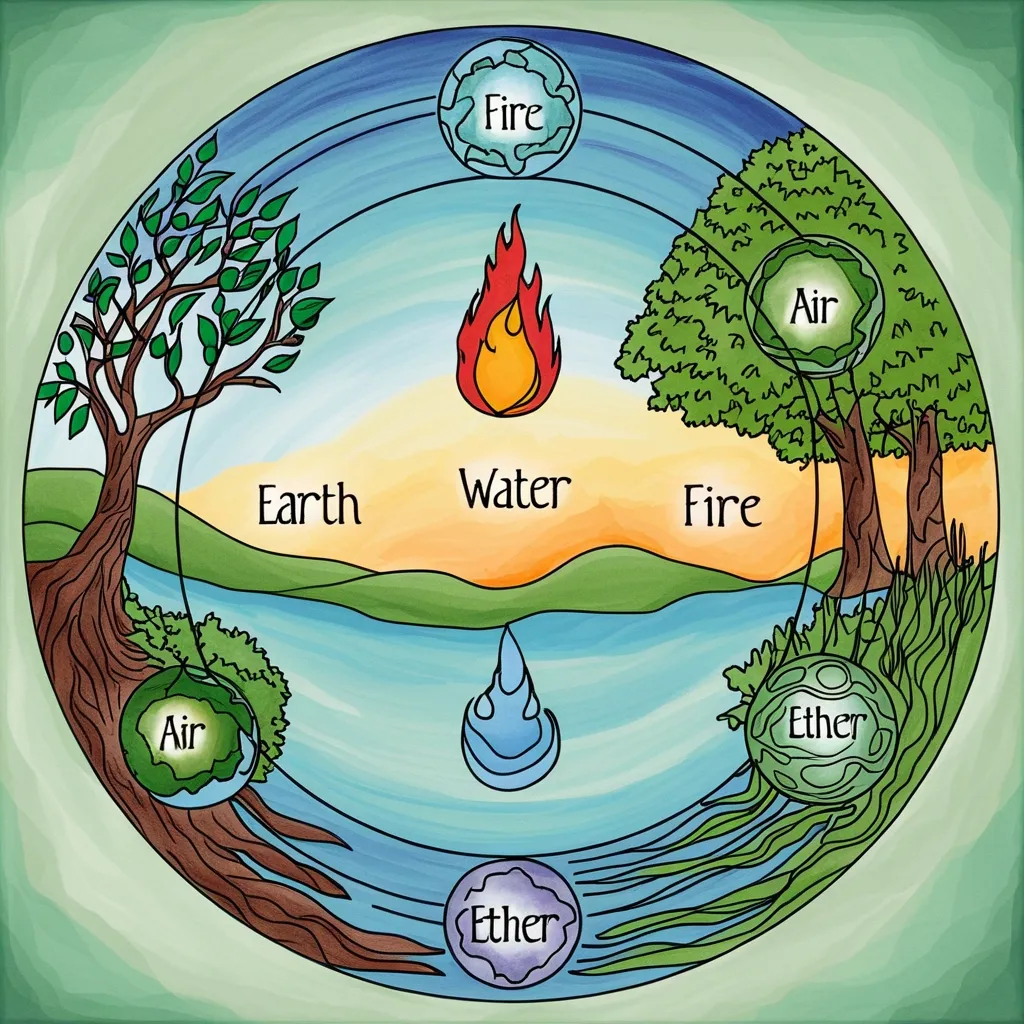The Yama-Niyama Framework: Ethical Pillars of Hindu Spiritual Practice
Have you ever wondered about the moral compass that guides Hindu spiritual practices? The Yama-Niyama framework stands as one of the most comprehensive ethical systems ever developed, yet many people outside traditional yoga circles remain unfamiliar with its profound wisdom and practical applications.
The Yama and Niyama are disciplines that guide how we interact with the world around us and our inner landscape[1]. These principles form the foundation of yoga philosophy, acting as the DNA of spiritual practice that influences every aspect of a practitioner’s life.
“When you perform any action with awareness of its ethical implications, you transform ordinary living into spiritual practice.”
What makes this framework so powerful is its dual approach - addressing both our external behaviors and internal attitudes. The Yamas function as restraints or ethical guidelines for our interactions with others and the world at large[1][4]. The Sanskrit word “Yama” literally means “restraint,” pointing to behaviors we should abstain from or control[4]. Meanwhile, the Niyamas serve as personal observances that shape our inner world and relationship with ourselves[1].
Is it possible that a system developed thousands of years ago could still offer relevant guidance for our modern moral challenges?
The beauty of the Yama-Niyama framework lies in its practical nature. These aren’t abstract philosophical concepts but lived practices that transform character through daily application. All normative philosophers have suggested that Yama and Niyama are moral and ethical principles that must be practiced[3]. They aren’t merely theoretical ideals but actionable guidelines that shape behavior and consciousness.
The five Yamas present a comprehensive approach to ethical living. Ahimsa (non-violence) teaches us to avoid causing harm through actions, words, or even thoughts. Satya (truthfulness) emphasizes honesty in all our communications. Asteya (non-stealing) reminds us not to take what isn’t freely given. Brahmacharya guides the right use of energy, while Aparigraha (non-possessiveness) promotes detachment from material things[4][5].
“The practice of Yama is not about restriction but about freedom - freedom from the behaviors that cause suffering to ourselves and others.”
Have you considered how these restraints might actually expand rather than limit your experience of life?
The Niyamas complement these external restraints with internal disciplines. Saucha (cleanliness) applies to both physical and mental purity. Santosha (contentment) cultivates gratitude for present circumstances. Tapas (self-discipline) builds willpower through voluntary challenges. Svadhyaya (self-study) involves reflection on sacred texts and one’s thoughts. Ishvara Pranidhana encourages surrender to something greater than oneself.
The framework provides a balanced approach to duty by addressing both fixed duties (niyata dharma) and relative duties based on our specific conditions (vihita dharma)[3]. This flexible yet principled approach to ethics recognizes that what is right depends partly on context while maintaining core values.
“We must blend right and good. Merely going for good won’t ultimately be good. Merely going for right won’t ultimately be right.”[3]
This insightful perspective from the tradition shows how the Yama-Niyama framework avoids rigid moralism while still providing clear ethical guidance. The system recognizes that ethical living requires both universal principles and contextual wisdom.
What distinguishes this ethical system from many others is its emphasis on character development rather than rule-following. The practices aim to transform consciousness itself, recognizing that truly ethical behavior flows naturally from a purified mind and heart. This approach stands in contrast to systems that focus primarily on external compliance with rules without addressing the inner dimensions of morality.
Hindu sages understood something profound about human development - that ethical behavior creates the necessary foundation for advanced spiritual practices. Without moral restraint, meditation and other techniques might actually amplify negative tendencies rather than transcend them. The Yamas and Niyamas create the conditions for genuine spiritual growth.
The framework operates on multiple levels simultaneously. On the personal level, it guides individual behavior and attitude. In relationships, it shapes how we interact with others. On the societal level, it provides principles for harmonious community living. And on the spiritual level, it prepares consciousness for deeper insights and experiences.
“The Yamas and Niyamas are not merely preliminary practices; they are the very substance of the spiritual life.”
Perhaps what’s most remarkable about this system is its enduring relevance. Despite being formulated thousands of years ago, the Yama-Niyama framework addresses issues that remain central to human existence - how we handle conflict, speak truth, relate to possessions, manage energy, and cultivate inner peace.
The practicality of this system makes it accessible to people from various backgrounds. While embedded in Hindu philosophy, the principles transcend cultural and religious boundaries, offering wisdom that can be applied in diverse contexts. This universal quality has contributed to its adoption by people worldwide seeking ethical guidance for daily living.
What would change in your life if you applied these principles consistently?
The first Yama, Ahimsa (non-violence), extends far beyond avoiding physical harm. It encompasses thoughts, words, and actions, challenging us to examine subtle forms of violence we might overlook. This principle has inspired movements for social change while also guiding personal interactions.
Satya (truthfulness) calls for honesty that balances clarity with compassion. It’s not simply about stating facts but communicating in ways that serve truth in its highest form. In an era of misinformation, this principle offers crucial guidance for responsible communication.
Have you noticed how often small untruths create complications in your life?
Asteya (non-stealing) reminds us to respect what belongs to others - not just material possessions but also time, ideas, and emotional energy. This principle promotes respect for intellectual property, punctuality, and emotional boundaries.
Brahmacharya teaches the wise use of vital energy. Rather than wasting our life force on distractions, it encourages channeling energy toward meaningful pursuits. This principle offers valuable guidance in an age of constant stimulation and scattered attention.
Aparigraha (non-possessiveness) addresses our relationship with material things and attachments of all kinds. By encouraging a lighter hold on possessions, it promotes sharing, generosity, and freedom from excessive consumption - a powerful antidote to modern consumerism.
“Freedom comes not from acquiring more but from desiring less.”
The Niyamas complement these restraints with positive observances. Saucha (cleanliness) applies to our physical environment, body, speech, and mind. This principle recognizes the connection between outer order and inner clarity.
Santosha (contentment) cultivates gratitude for what we have rather than craving what we lack. This practice counters the perpetual dissatisfaction promoted by advertising and social comparison.
Do you find yourself constantly wanting more, or can you appreciate what’s already present in your life?
Tapas (self-discipline) builds willpower through voluntary challenges. By choosing difficult practices for growth, we develop resilience and determination that serve all areas of life.
Svadhyaya (self-study) involves honest reflection on our thoughts, behaviors, and beliefs. This practice promotes self-awareness and continuous learning through both traditional texts and personal experience.
Ishvara Pranidhana encourages surrender to something greater than oneself - whether conceived as a deity, universal consciousness, or simply the recognition of forces beyond our control. This principle cultivates humility and perspective.
The Yama-Niyama framework provides a holistic approach to ethics that acknowledges both social responsibility and personal development. It recognizes that truly ethical living flows from inner transformation rather than mere external compliance with rules.
“The greatest battles we fight are not with others but with the undisciplined aspects of our own nature.”
What makes this system particularly valuable is its comprehensive nature. It addresses our relationship with ourselves, others, possessions, truth, power, and the divine. Few ethical frameworks cover such a complete spectrum of human experience.
The practices work together synergistically. For instance, truthfulness (Satya) becomes more skillful when guided by non-violence (Ahimsa). Self-discipline (Tapas) becomes more effective when balanced with contentment (Santosha). Each principle reinforces and refines the others.
In a world facing environmental crisis, social division, and spiritual confusion, the wisdom of this ancient framework offers fresh perspectives on contemporary challenges. Its emphasis on non-harm, truthfulness, moderation, and inner peace provides guidance for sustainable and harmonious living.
Have you considered how applying these principles might address not just personal but collective challenges we face?
The Yama-Niyama framework reminds us that ethical living isn’t separate from spiritual development but forms its very foundation. Through these practices, we create conditions for deeper awareness while contributing positively to the world around us.
The system invites ongoing reflection and application rather than rigid adherence to rules. It encourages practitioners to discover how these principles manifest in their unique circumstances, making it a living tradition rather than a static set of commandments.
In essence, the Yama-Niyama framework offers a path to freedom through discipline, peace through ethical living, and wisdom through principled action. Its enduring value lies in its practical approach to the perennial questions of how to live well, relate wisely, and grow spiritually.






